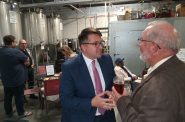40 Years Helping Ex-Cons Rejoin Society
Milwaukee's trailblazing group Project RETURN celebrates its 40th anniversary.
At a time when the national focus is on longstanding issues of racial disparities in the criminal justice system it is worthy of note that a Milwaukee organization founded by a national civil rights leader is observing its 40th anniversary helping ex-convicts transition back to society.
According to its mission statement, “Project RETURN (Returning Ex-incarcerated people To Urban Realities and Neighborhoods) exists to help men and women make a positive, permanent return to community, family and friends.
Ellwanger, now 86, served as pastor of Cross Lutheran Church, 1821 N. 16th St., from 1967 until his retirement in 2001. He crossed paths many times with Father James Groppi, whose Roman Catholic parish was not far from Ellwanger’s. He joined in the city’s Open Housing marches of that time. The Cross church community later was concerned with recidivism in the city and founded Project RETURN to assist returning convicts, as well as to serve as a diversion from the prison system for some.
The group is planning a 40th anniversary virtual celebration Tuesday, October 27th from 6:30 to 8:00 p.m. In addition to jobs, the group helps find housing, clothing, training, alcohol and drug treatment and other assistance.
I spoke with Pastor Joe, as he is called, by video. He told me that times have changed since the era when Milwaukee had many factories with open jobs for unskilled workers. “There was always the push back for returnees coming back from incarceration and society’s stereotype that anyone who is in prison is a dangerous man,” he said. “So it has always been a challenge to get someone a job.”
On Mass Incarceration, Ellwanger sees import in society’s newfound awareness of an old problem: “Society is not only willing to talk about it, it is encouraging that the term has come to be pretty well understood by people that we have a mass of people incarcerated who shouldn’t be there. It’s a relatively new term. The whole country has a problem with over-incarceration.”
Ellwanger’s early involvement in the Civil Rights movement can be traced to his first parish assignment: “Without a doubt my being in Alabama having an African American congregation in Birmingham from 1958-1967 — that’s what really put down my roots in justice work and discovered and realized that not only is justice work something that American citizens should be engaged in, but that the religious community and the church should be engaged in. Martin Luther King was demonstrating that.”
Although Ellwanger is not involved in the day-to-day operations of Project RETURN, he says he keeps his “feelers” out. He has worked with the Alumni Group, of former clients who come together to support and give back, he said. “It helps me keep abreast of the issues, thinking and problems” of returnees.
To complicate matters, Ellwanger says about half of parole and probation officers come from rural backgrounds where they had little or no contact with people of other races. A “white supremacist culture,” he believes, lies “just underneath the surface.”
Ellwanger will speak at the event along with Rodney Evans, the Board President of Project RETURN. Evans, a City of Milwaukee employee for the last six years, tells me he was sent to Project RETURN 16 years ago as a diversion from serving a prison term. He said he never stopped attending meetings, and credits the group for helping him to discover himself and giving him an opportunity to make a difference in his life and those of others.
Here is the complete Zoom interview by Urban Milwaukee with Pastor Ellwanger. Use the passcode: .tzF5yuy
If you think stories like this are important, become a member of Urban Milwaukee and help support real, independent journalism. Plus you get some cool added benefits.
Plenty of Horne
-
Villa Terrace Will Host 100 Events For 100th Anniversary, Charts Vision For Future
 Apr 6th, 2024 by Michael Horne
Apr 6th, 2024 by Michael Horne
-
Notables Attend City Birthday Party
 Jan 27th, 2024 by Michael Horne
Jan 27th, 2024 by Michael Horne
-
Will There Be a City Attorney Race?
 Nov 21st, 2023 by Michael Horne
Nov 21st, 2023 by Michael Horne






















